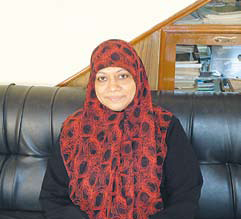Located deep in a densely-populated, over-crowded and largely Muslim locality in Bangalore is a home of cheer and hope that I only very recently discovered. Founded by an amazing woman, Sajeeda Begum, Aasra is probably the only home for destitute and abandoned Muslim women in Karnataka, and, I suppose, one of the few such institutions in the whole country.
Housed in a double-storey rented bungalow, Aasra immediately struck me, as I entered, as a cheerful, neatly-maintained place, one that you could very well call ‘home’. Little girls flitted in and out of the room where I sat waiting for Sajeeda, while old women squatted on chairs sunning themselves. Sajeeda entered and introduced herself, and I felt immediately at ease. Smiling and simple, she seemed the sort of person one could get along with at the very outset itself.

Sajeeda explained how and why she decided to establish Aasra. She related horrific case after case of Muslim women, deserted by their husbands or victimised by domestic violence, dowry oppression, sexual harassment or many other forms of abuse. Aasra was intended to be a short-stay home for such women, where, in a culturally-familiar atmosphere, they could receive shelter as well as legal and psychological counseling and help, including basic working skills, so as to enable them to re-build their lives.
Till date, Sajeeda and her team have handled several hundred such cases. Each case is analysed by experts and counsellors. This free counselling is provided in person or over the phone, through a helpline. Wherever needed, Aasra provides oppressed women police protection and offers legal aid, too. So far, some five hundred such women have received help from Sajeeda and her colleagues. More than a dozen women stay at Aasra at any time, many of them being divorcees and widows who have no other support and whose relatives don’t care for them. Some of them are young girls, whose education Aasra arranges for.
What Sajeeda is doing is, of course, a work of immense courage. How did she get into this, I asked her. “I hail from a business family. My father was a landlord but he was very charitable towards the poor and needy, irrespective of caste, creed or religion. He helped everybody. That really made a mark on me. He was a major inspiration, though my mother also encouraged me to be socially-engaged,” Sajeeda says.
Even after she graduated in Arts from the Maharani’s College in Bangalore and got married, Sajeeda continued her social involvement, running tailoring classes for the poor. She had three children, but yet, running a large family didn’t curb her passion of helping those in need.
In 1991, Sajeeda and some other socially-active Bangalore based Muslim women started the Tanzeemul Mohsinath as an organisation to help poor women and children. In 2004, it was registered as a Trust. In 2009, Aasra was set up as a home for the helpless Muslim women, under the aegis of the Trust. Prior to setting up Aasra, Sajeeda worked with a well-known Bangalore-based women’s group, Vimochana. “Their professionalism was really an inspiration,” she reveals. And that was how she decided to launch a platform for abandoned and mistreated Muslim women, because such women hardly had anyone to platform to reveal their anguish and problems. Many Muslim men, including “leaders”, remained indifferent to or silent on their problems, which meant that they needed to speak for and help themselves, Sajeeda says.
With mainly her own personal funds, Sajeeda rented out a house in Bangalore where Aasra has its premises. Aasra has no permanent sources of funding, and relies almost entirely on Sajeeda’s own personal funds and her friends and relatives to keep it going. Till about mid-2009, she received some funds from the Wakf Foundation, but that soon stopped. Yet, she did not give up and continued Aasra mainly with her money and funds contributed by own children. “Today, I get no funds from the bigwigs in the Muslim community. They do not want to help. Maybe because the cause of women for whom I am working is not considered big for them,” Sajeeda notes. “The patriarchal domination in our society is so much that it is a big task for me to change their mind-set. We are conditioned to believe that the father, husband, brother or son has to be the care taker of women and that women must always be dependent on men. That is why I think Muslim women need their own economic and educational independence and space.”
Luckily for Sajeeda and her team, Aasra was recently recognised by the state’s Women and Child Welfare Department and so is now eligible for some government support. “It’s not much, though, because I have to handle dozens of new cases each month, including of terrible abuse. It’s a tough job, but I am not going to give up,” says Sajeeda.
“My mission in life is to make a positive difference to the lives of helpless women. I have completely stopped shopping or indulging in extravagant spending. God says that doing your duty towards society and the people is very important. Many Muslims have forgotten this altogether. Many of them focus only on religious rituals alone but the real meaning of life is to help suffering humanity first,” beams Sajeeda as she puts her arm around a little, 10 year-old girl who was sold by her father for a few rupees but was recently rescued by Aasra.
Meeting Sajeeda really uplifted my spirits. At least somewhere in some corner of India, one woman was working towards giving Muslim women their right to a dignified life, and there could be nothing more positive than this as far as I was concerned.






Comments
kindly seek your email id
kindly seek your email address
kindly need your email iddress
kindly share your email address
Add new comment